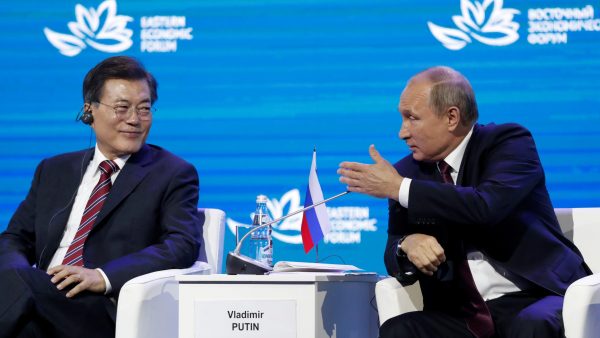Moon’s plans to develop trilateral commercial relations have drawn praise from pro-unification groups within South Korean civil society, who have highlighted the historic economic connection between the Korean Peninsula and Russia.
South Korea’s interest in pursuing economic collaboration with the North and the Russian Federation coincides well with Moscow’s interests. After fluctuations in Moscow’s relations with both Pyongyang and Seoul during the 1990s and early 2000s, Moscow has strived to work in a balanced fashion with two separate political entities on the Peninsula.
At first glance, Russia is not the most obvious choice of partner for inter-Korean trilateral economic collaboration. China is by far North Korea’s largest trade partner, and North Korea–Russia trade levels — in addition to being minimal compared with China–North Korea commerce — are heavily imbalanced toward imports of Russian goods. Similarly, while Russia’s trade with South Korea has been steadily growing (commodity turnover between the countries grew by US$4.3 billion between 2016 and 2017), China–South Korea trade is still much more voluminous than Russia–South Korea commercial exchange.
One potential reason why South Korea has chosen Russia as its main third partner in its economic integration bid is because of Russia’s handling of its relationship with South Korea throughout the 2017 THAAD controversy. China took economic measures against South Korea, but the Russian Federation took no such actions. This has meant that Moscow and Seoul do not need to mend their relationship in the way Beijing and Seoul have been doing, which has left Russia in an advantageous position to foster rapprochement.
North Korea has shown some positive signs that indicate the potential for cooperation with South Korea and Russia. Russia’s Minister for Far Eastern Development Alexander Galushka recently led a delegation to Pyongyang to discuss bilateral economic cooperation with the North. The two sides broached the subject of collaborating in fields such as energy and transportation, which are issues of common interest to Russia and South Korea under Moon’s nine bridges initiative.
But the actual prospects of increased North Korea–Russia trade activity are dubious at best. In 2014, Galushka announced a goal of increasing the North Korea–Russia bilateral trade volume to US$1 billion by 2020. Nevertheless, as of September 2017 (before the UN Security Council passed Resolution 2375), trade between North Korea and Russia amounted to approximately US$77 million.
Russia–South Korea collaboration on integrating North Korea economically could also run counter to US initiatives to corner North Korea — especially Washington’s extensive use of economic sanctions, which have been hampered by poor policy coordination between states.
The Kremlin has officially supported sanctions against North Korea at the UN Security Council, but deeper insight into the Russian policy community reveals that officials in Moscow are sceptical of the possibility of North Korean disarmament. Russia is primarily interested in economically developing its Far East. To this end, both North and South Korea serve critical purposes: North Korea’s direct access to the sea helps alleviate difficulties for Russian logistics, and South Korean investment potential is crucial. Peninsular disarmament is not a policy imperative for Moscow to the same extent that it is for Washington, nor does the Kremlin view the sanctions advocated by Washington as an effective means of achieving denuclearisation.
Given that Russia and the United States do not have directly clashing interests, Seoul does not need to balance between its two major partners. As a result, Seoul is undertaking certain policies in Northeast Asia that are closer in line with Russian interests.
North Korea itself poses perhaps the greatest risk of derailing Moscow and Seoul’s aspirations for establishing a trilateral cooperative economic relationship. In 2016, South Korea suspended a joint coal trade agreement with the North and Russia due to the former’s missile tests. North Korea’s own provocations could therefore be the undoing of any progress the Moon and Putin governments achieve toward a greater degree of North Korean economic integration.
Russia needs to maintain its claim to being a responsible member of the international community, and South Korea must be careful not to upset its ally by undermining Washington’s policy initiatives toward North Korea. Russia and South Korea must navigate the hurdles to cooperation that the international sanctions regime has set while hoping that Pyongyang’s unpredictability will not be the ultimate undoing of their aspirations.
Anthony V Rinna is an analyst on Russian foreign policy in East Asia for the Sino-NK research group. He currently resides in South Korea.

